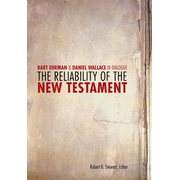The New Orleans Baptist Theological Seminary holds a forum called the “Greer-Heard Point-Counterpoint Forum in Faith in Culture.” Previously, they have had forum dialogues on the resurrection of Jesus, Intelligent Design, Atheism, and religious pluralism. In 2008, the subject was on the textual criticism of the New Testament, the reliability of the text, and the theological implications of the issue and evidence. While, on that occasion, several speakers gave papers, the two plenary presenters were Bart Ehrman (from a viewpoint of skepticism) and Dan Wallace (from a viewpoint of optimism).

That dialogue was recently published by Fortress Press under the title: The Reliability of the New Testament: Bart Ehrman and Daniel Wallace in Dialogue (2011). When I was in seminary, I learned a good deal about textual criticism, but this book offers a series of papers-turned-essays that really drive at the heart of key questions regarding the implications of the state of the issue. The state, that both Wallace and Ehrman agree upon, is that we simply do not have 100% accuracy in reconstructing the “original” books that were written to compose the NT. In fact, it appears that such an endeavor is impossible (at least with what evidence we have now). Ehrman concludes that basing Christian faith on what we have of the NT now is shaky ground. Wallace urges that there is certainly enough evidence (and trust in the accuracy of text-critical methods) to “know” what the NT says and what the original authors intended to communicate, without needing 100% accuracy.
The core discussion by Ehrman and Wallace comprises about 45 pages of the book. In addition, we find a number of other excellent essays. Dale Martin writes about why it is important for Christians to have a serious “theology of Scripture” so that they know how and what to learn from Scripture and also how it can be “used” for theological, social, and ethical purposes. Craig Evans reflects briefly on some of the theological issues bound up with this reality that there are words, phrases, and even passages that NT scholars are unsure about textually – what does that mean for our faith? What is our faith built on?
What I really like about this book is that the “so what” questions of textual criticism are really highlighted. Also, Ehrman and Wallace, especially, write in such a way that the discussion is accessible to a wider group of interested readers, not just those who already know something about textual criticism. This book is written keeping in mind people who have no idea who the Alands are!
I am going back and forth on whether or not to assign the Ehrman/Wallace debate for my undergrad students to read. It is certainly easy enough to understand. But the kind of things they discuss will scandalize many Christians who see the Bible as a magically perfect book. The idea of scribal errors (whether intentional or accidental) and uncertain texts (like the adultery pericope in John) would bury their faith in a sea of doubt, confusion, and uncertainty. For many of my students (as I would have been before seminary), the Bible is a “perfect” book from God, the center of the Christian religion. What happens when that foundation is found to be fraught with “I don’t knows” and “maybe that reading is not original.” Wallace and Evans (and others in the book) affirm that no cardinal doctrine of Scripture hangs on textually-uncertain passages. True enough, and maybe Erhman would agree. However, how can this material be presented in a way that continues to encourage young Christians? I don’t want to withhold the truth of the messiness of the issues from my students, but is this the right time (in the second year of college)? Probably not.
Overall, this was a fantastic read and I thank Fortress for making this conversation available to a wider audience. Please do check out the book and consider how it might be of help in your own courses and ministries.











